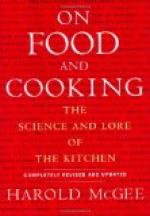“I know,” said the toddler, brightening up.
“What meal do we have in the morning?”
“Oatmeal. Tum on; leth’s do.”—Sel.
Seneca, writing to a friend
of his frugal fare which he declares
does not cost a sixpence a
day, says:—
“Do you ask if that can supply due nourishment? Yes; and pleasure too. Not indeed, that fleeting and superficial pleasure which needs to be perpetually recruited, but a solid and substantial one. Bread and polenta certainly is not a luxurious feeding, but it is no little advantage to be able to receive pleasure from a simple diet of which no change of fortune can deprive one.”
Breakfast: Come
to breakfast!
Little ones and all,—
How their merry footsteps
Patter at the call!
Break the bread; pour
freely
Milk that cream-like
flows;
A blessing on their
appetites
And on their lips of
rose.
Dinner may be pleasant
So may the social tea,
But yet, methinks the
breakfast
Is best of all the three.
With its greeting smile
of welcome,
Its holy voice of prayer,
It forgeth heavenly
armor
To foil the hosts of
care.
—Mrs. Sigourney.
Health is not quoted in the
markets because it is without
price.—Sel.
It is a mistake to think that
the more a man eats, the fatter and
stronger he will become.—Sel.
DESSERTS
Custom has so long established the usage of finishing the dinner with a dessert of some kind, that a menu is considered quite incomplete without it; and we shall devote the next few pages to articles which may be deemed appropriate and healthful desserts, not because we consider the dessert itself of paramount importance, for indeed we do not think it essential to life or even to good living, but because we hope the hints and suggestions which our space permits, may aid the housewife in preparing more wholesome, inexpensive dishes in lieu of the indigestible articles almost universally used for this purpose.
We see no objection to the use of a dessert, if the articles offered are wholesome, and are presented before an abundance has already been taken. As usually served, the dessert is but a “snare and delusion” to the digestive organs. Compounded of substances “rich,” not in food elements, but in fats, sweets, and spices, and served after enough has already been eaten, it offers a great temptation to overeat; while the elements of which it is largely composed, serve to hamper the digestive organs, to clog the liver, and to work mischief generally. At the same time it may be remarked that the preparation of even wholesome desserts requires an outlay of time and strength better by far expended in some other manner. Desserts are quite unnecessary to a good,




